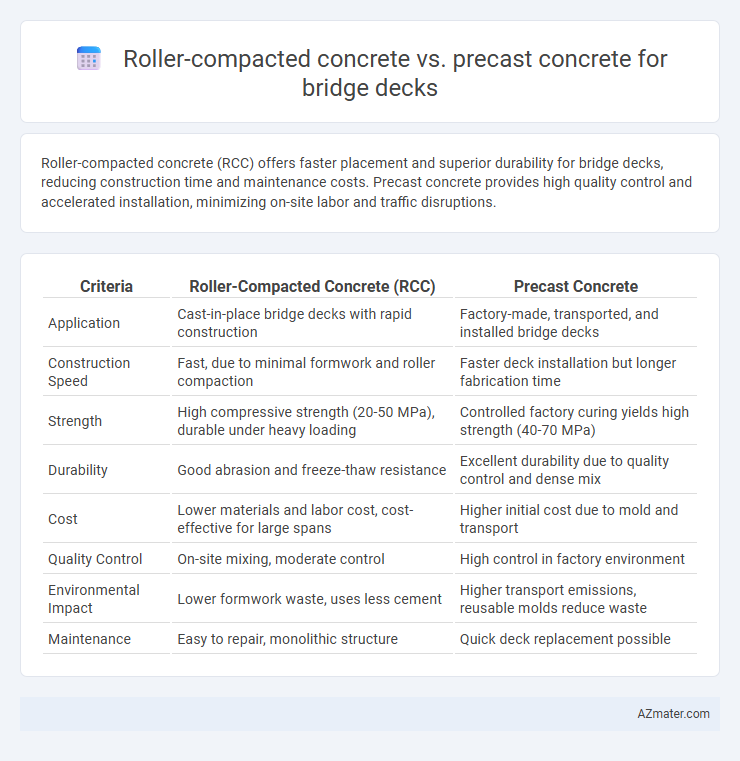Roller-compacted concrete (RCC) offers faster placement and superior durability for bridge decks, reducing construction time and maintenance costs. Precast concrete provides high quality control and accelerated installation, minimizing on-site labor and traffic disruptions.
Table of Comparison
| Criteria | Roller-Compacted Concrete (RCC) | Precast Concrete |
|---|---|---|
| Application | Cast-in-place bridge decks with rapid construction | Factory-made, transported, and installed bridge decks |
| Construction Speed | Fast, due to minimal formwork and roller compaction | Faster deck installation but longer fabrication time |
| Strength | High compressive strength (20-50 MPa), durable under heavy loading | Controlled factory curing yields high strength (40-70 MPa) |
| Durability | Good abrasion and freeze-thaw resistance | Excellent durability due to quality control and dense mix |
| Cost | Lower materials and labor cost, cost-effective for large spans | Higher initial cost due to mold and transport |
| Quality Control | On-site mixing, moderate control | High control in factory environment |
| Environmental Impact | Lower formwork waste, uses less cement | Higher transport emissions, reusable molds reduce waste |
| Maintenance | Easy to repair, monolithic structure | Quick deck replacement possible |
Introduction to Bridge Deck Construction Methods
Roller-compacted concrete (RCC) offers rapid placement and high durability for bridge decks, utilizing a drier mix compacted by heavy rollers, resulting in a dense and strong surface ideal for heavy traffic loads. Precast concrete bridge decks are manufactured off-site in controlled environments, ensuring uniform quality and accelerating construction through modular installation, minimizing on-site disruption. Both methods improve bridge deck performance, but RCC emphasizes on-site speed and cost-efficiency, while precast concrete enhances precision and reduces construction time.
Overview of Roller-Compacted Concrete (RCC)
Roller-compacted concrete (RCC) is a stiff, low-slump concrete mixture placed using asphalt paving equipment and compacted with vibratory rollers, making it highly suitable for bridge deck applications requiring rapid construction and durability. RCC's dense and impervious properties offer excellent resistance to wear and environmental factors, reducing maintenance needs on bridge decks compared to conventional concretes. The material's cost-effectiveness, combined with its high compressive strength and ability to accommodate heavy traffic loads, positions RCC as a preferred choice for sustainable and resilient bridge deck construction.
Understanding Precast Concrete Decks
Precast concrete decks consist of factory-manufactured slabs that are transported and installed on-site, offering controlled quality and faster construction times compared to Roller-compacted concrete (RCC). These decks provide excellent durability, uniform strength, and reduced curing time, significantly minimizing traffic disruptions during bridge construction. The use of high-performance concrete in precast units enhances resistance to environmental degradation, ensuring long-term structural integrity for bridge decks.
Comparing Installation Processes
Roller-compacted concrete (RCC) for bridge decks involves a swift placement process using heavy rollers to compact the concrete, allowing for rapid construction and early load application. Precast concrete bridge decks require offsite fabrication, precise lifting, and alignment during installation, which can reduce on-site construction time but necessitates detailed logistics and crane operations. RCC minimizes joints and formwork on-site, while precast units offer consistent quality with faster assembly but may face challenges in transportation and handling.
Durability and Longevity of RCC vs Precast
Roller-compacted concrete (RCC) offers exceptional durability for bridge decks due to its dense, low-permeability structure, which resists freeze-thaw cycles and chemical attacks better than many traditional concretes. Precast concrete, while manufactured under controlled conditions ensuring high quality and uniformity, may have joints and connections that can become vulnerable points impacting long-term durability. RCC's monolithic placement and rapid strength gain contribute to enhanced longevity and reduced maintenance needs compared to precast segments susceptible to joint deterioration.
Structural Performance and Load Capacity
Roller-compacted concrete (RCC) offers enhanced structural performance in bridge decks through its high density and low permeability, which improves durability and resistance to heavy loads. Precast concrete provides superior load capacity due to controlled manufacturing conditions, ensuring uniform strength and precise dimensions that accelerate construction time and maintain structural integrity. Comparing both, RCC allows for mass placement with cost efficiency while precast concrete delivers consistent quality and higher flexural strength critical for long-span bridge decks.
Cost Analysis: RCC vs Precast Concrete
Roller-compacted concrete (RCC) offers significant cost advantages for bridge decks by reducing material and labor expenses due to its simplified placement and faster curing time compared to precast concrete, which involves higher manufacturing and transportation costs. RCC eliminates the need for formwork and extensive curing infrastructure, leading to lower on-site construction costs and shorter project durations. Precast concrete, while offering quality control and accelerated installation, often incurs higher initial investment and logistical expenses that can increase overall project costs.
Construction Speed and Project Timelines
Roller-compacted concrete (RCC) enables faster construction speeds for bridge decks due to its rapid placement and minimal curing time, reducing overall project timelines significantly. Precast concrete components require extensive off-site fabrication but allow accelerated on-site assembly, limiting disruption and enabling concurrent foundation work. The choice between RCC and precast concrete hinges on balancing on-site efficiency with prefabrication logistics to optimize construction schedule and resource allocation.
Maintenance Requirements and Lifecycle Costs
Roller-compacted concrete (RCC) bridge decks generally offer lower maintenance requirements due to their high density and abrasion resistance, reducing surface deterioration and crack propagation. Precast concrete decks allow for quicker installation and easier section replacement, but may incur higher lifecycle costs from joint sealing, transportation, and potential joint maintenance. Evaluating total lifecycle costs involves balancing RCC's durability and minimal upkeep against precast's expedited construction and modular repair advantages.
Environmental Considerations and Sustainability
Roller-compacted concrete (RCC) for bridge decks offers lower environmental impact due to reduced cement content and energy-efficient placement methods, resulting in decreased CO2 emissions compared to traditional precast concrete. Precast concrete involves factory-controlled production that minimizes waste and allows for recycling of materials but may incur higher transportation emissions due to off-site fabrication. Both methods support sustainability goals, with RCC promoting onsite material efficiency and precast enabling quality control and potential reuse of structural components.

Infographic: Roller-compacted concrete vs Precast concrete for Bridge deck
 azmater.com
azmater.com